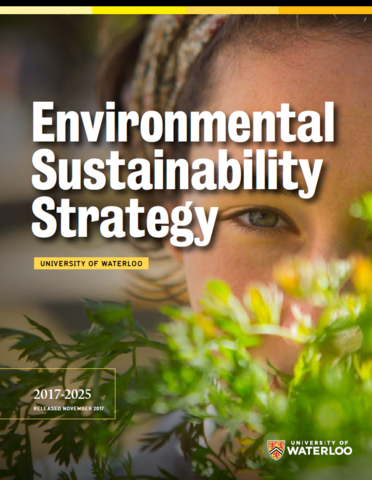
Overview
Waterloo's Environmental Sustainability Strategy articulates the goals and objectives the campus will be working towards to advance environmental sustainability. It was developed between 2016-2017 by the President's Advisory Committee on Environmental Sustainability through a collaborative process.
This strategy has three interdependent goals:
-
Be a leader in sustainability education and research
-
Operate the campus sustainably
-
Embed sustainability practices into campus culture
These are meant to be broad and inspirational, and are further broken into 27 more specific objectives and five foundational actions to build momentum.
Read below for a summary of the objectives and foundational actions, or download the full pdf document to read the entire strategy.
Foundational actions

1. Core value
Waterloo will identify sustainability as a core value of the campus. Environmental sustainability does not need to be pursued for its own sake. The benefits are multifaceted and reach deeply into the academic, social, and physical fabric of the campus. It is, however, usually not afforded the priority to capture that value. The efforts illustrated throughout this strategy will be more effective and affective with a strong affirmation that sustainability, in all its aspects, is a core value shared by the entire campus.

2. Sustainability Office
Waterloo will strengthen the positioning of the Sustainability Office within the University. Many different departments across campus will be involved in achieving the goals and objectives of this strategy. No one unit can implement the diversity of actions needed to build progress, but the University must have an internal ability to credibly monitor, coordinate, communicate, and advise. The Sustainability Office can achieve this mandate and enhance Waterloo’s institutional capacity for self-evaluation and effective decision-making.

3. Sustainability Action Fund
Establishing a Sustainability Action Fund will help bridge the divides in funding sources and send a strong signal for development of projects and actions of this strategy. Furthermore, it will establish the tracking systems to understand the value within the projects, and embed communication and leveraging of the results. The fund will be additional to existing budgets, will be subject to existing approval processes, and have two components:
- A projects fund of $150,000 per year that will take applications for funding from any student, staff, or faculty member to advance the goals of this strategy. This fund will support projects that do not necessarily have a measurable financial return on investment, provided they generate value and positive impact. This portion would be managed by the President’s Advisory Committee on Environmental Sustainability.
- A revolving fund with $1 million of seed funding per year for 6 years, beginning in the 2018/19 fiscal year, to fast-track energy, waste, water, and other projects that have a measurable return on investment. The savings generated from the projects within the revolving fund will replenish the fund and be redeployed into new projects. This portion would be managed by Plant Operations.

4. Continual reporting
Waterloo
will
release
an
annual
sustainability
report
that
tracks
progress
against
each
of
the
objectives
herein.
It
will
work
with
all
departments
to
imbed
reporting
and
tracking
into
existing
processes
wherever
possible,
and
will
attempt
over
time
to
make
data
open-source
to
enable
further
study.
Waterloo
will
also
submit
its
information
every
three
years
to
maintain
a
STARS
designation.
This
transparency
is
crucial
to
catalyze
action.
Recognizing
that
sustainability
is
central
to
the
long-term
success
of
the
campus,
the
University
will
imbed
key
metrics
into
standardized
campus
reporting
and
core
success
metrics
in
addition
to
standalone
sustainability
reports.

5. Living Laboratory
Waterloo will reinvigorate its efforts to link academic expertise to operational objectives. As an education and research institution, the potential for innovation on campus is enormous. Students have completed class and capstone projects on campus sustainability for over 25 years, and numerous faculty members and research institutes have brought forward ideas and collaboration opportunities.
To ensure that this enthusiasm and these ideas are channelled towards the most impactful challenges and opportunities, the University will:
- Establish a formal database of research needs and knowledge gaps from non-academic departments. This database will be solicited on a regular basis and made available for course-based research projects and faculty researchers to tailor their expertise to specific and relevant topics, and form meaningful partnerships between academic and academic support units of the campus.
- Empower staff to engage with student and faculty groups by creating tools to assist in collaborative and interdisciplinary project design and evaluation, and encourage funding through the Sustainability Action Fund.
- Publicly display outcomes and results of all projects submitted to through the Living Laboratory framework to ensure that others can learn from successes and failures.
Goal 1: Be a leader in sustainability education and research

Teaching and learning
- by 2019, ensure undergraduate students from any program of study will have the opportunity to learn about sustainability in their courses
- by 2025, identify and implement flexible strategies for 5 programs of study to more deeply integrate sustainability within the curriculum
- by 2025, every startup emerging from supporting programs at Waterloo will have access to tools and training to imbed sustainability into their emerging business plans and models

Research
-
by 2020, celebrate sustainability research as a core thematic strength of Waterloo’s reputation and identity
- by 2025, become a world leader for research excellence in 5 sustainability-related themes
- by 2025, establish Waterloo as a “go-to” hub for knowledge and expertise on sustainability challenges
- by 2018, implement 3 new sustainability-related projects annually on campus using faculty and student expertise; by 2025, implement at least 8 new projects on campus annually
Goal 2: Operate the campus sustainably

Climate change
- by 2019, develop a long-term Climate and Energy Action Plan to achieve carbon neutrality by 2050, with interim targets for 2025 and 2035

Energy
- implement cost-effective and practical strategies to reduce or minimize growth in energy use on campus

Waste
- by 2025, achieve a 60% diversion rate; by 2035, become a zero-waste (90% diversion rate) campus

Water
- by 2025, reduce water intensity by 5% per square metre from a 2015 baseline
- by 2025, expand the deployment of stormwater management technologies to targeted areas

Transportation
- by 2025, increase to 90% the proportion of commuting trips made by walking, cycling, transit, carpooling, or teleworking from a 2016 baseline of 85%
- by 2020, increase electric and alternative-fuel vehicle use on campus
- by 2025, reduce fossil fuel consumption across the campus fleet by 25% from a 2015 baseline

Grounds
- by 2025, all University grounds will be maintained according to sustainable landscaping standards, and plans developed for remediation and preservation of specific natural areas of concern

Food
- by 2025, 40% of all Food Services food and beverage purchases are produced on-site, locally-sourced, or are third-party certified for sustainability
- by 2018, achieve and maintain a Fair Trade Campus designation
- by 2020, deliver multifaceted programming to grow student and employee awareness about healthy and sustainable food choices

Procurement
- by 2020, evaluate life cycle cost and require sustainability disclosure from suppliers for all purchasing decisions over $100,000
- by 2018, establish baseline data and targets to improve the percent of campus-wide purchases that meet third-party standards for paper, electronic equipment, and cleaning supplies
Goal 3: Embed sustainability practices into campus culture

Communication
- by 2020, Waterloo broadly distributes timely and audience-relevant information about sustainability initiatives and opportunities within the campus community

Student engagement
- by 2020, additional programming is developed for incoming students during orientation and in residences to encourage sustainable living on campus
- by 2018, establish a sustainability leaders program in partnership with students from residences, clubs and societies, student government, and for students in off-campus housing

Employee engagement
- by 2025, increase from 5% to 25% the proportion of university departments that are Green Office certified

Community engagement
- by 2020, Waterloo is recognized as a sustainability leader in Waterloo Region
